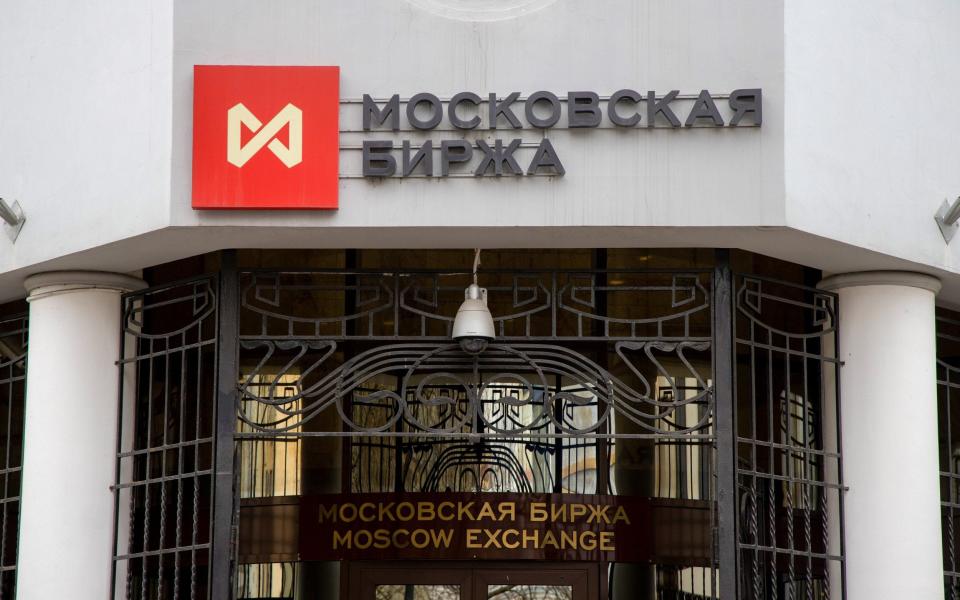Investors have £1bn trapped in Russian stock market

More than £1bn of investors’ money has been trapped in Russia after asset managers including JP Morgan suspended funds operating in the country's stock market.
The Moscow exchange has been suspended since Monday after companies lost a third of their value in one of the worst collapses in history.
Funds invested in Russian stocks, including emerging market funds widely owned by British DIY investors, have since been suspended, locking investors into the falling market. Vladimir Putin is expected to temporarily stop foreign investors from selling Russian assets, including shares.
British fund shop Schroders, which has a £305m stake in Russia via its Emerging Europe fund, has blocked customers from withdrawing their money. Other investment groups, including America’s JP Morgan and Switzerland’s UBS and Pictet Asset Management have also frozen withdrawals for funds that have large investments in Russia.
The JPM Emerging Europe Equity, JPMorgan Russia Equity and JPMorgan Emerging Europe Equity funds have been suspended indefinitely with immediate effect. British asset manager Liontrust has also suspended dealing in its dedicated Russia fund.
Many funds invested in “emerging European” countries have already lost more than a third of their value so far this year. More than 37pc of the value of the Aberdeen Eastern European Equity fund has been wiped off since January. However, the fund shop failed to respond when this newspaper asked whether their funds would be suspended.
Meanwhile, the BlackRock Emerging Europe fund has fallen 34pc. This fund has been suspended since March 1.
American group Barings has also closed its Eastern Europe fund. However, investors in this fund have already lost almost half their cash so far in 2022.
Rob Burgeman, of wealth manager Brewin Dolphin, said many more funds would be forced to freeze assets.
“They have no choice, the Russian market has been shut for two days so the money managers don’t know how much their investments are even worth anymore,” he said. “These companies don’t do this lightly and it could take a while to resolve itself.”
Asset managers have the power to temporarily close funds in extreme conditions. Property funds worth a combined £13bn blocked savers from taking out their cash in 2020 as the pandemic struck, saying they could no longer accurately price their assets as stock markets plunged. Funds run by Neil Woodford were also suspended in 2019 after to prevent a run on their assets.
Unprecedented international sanctions aimed at crippling Russia’s financial system have already caused economic turmoil. Moscow’s MOEX stock index dropped 33pc in a single session last week as investors fled Russian assets, a plunge that was the fifth worst in market history. The fall knocked $190bn off Russia’s blue-chip stocks and the index has lost half its value in just three months. Overseas investors owned about $86bn of Russian shares at the end of 2021, according to the Moscow Exchange.
The rouble plunged as much as 30pc to 120 per dollar on Monday. Inflation in Russia is expected to rise to 10pc.
When the Moscow market does reopen, these funds are expected to remain closed for some time, Mr Burgeman said. Even if fund managers are able to sell their investments, they will not be able to get their money out of the country due to ongoing sanctions.
The Kremlin also banned Russians from transferring foreign currency abroad.
A spokesman for JP Morgan said: “We are closely monitoring the risks and remain focused on acting in the best interests of our clients and shareholders, at all times. The suspension will be reviewed on an ongoing basis.”
A spokesman at Baillie Gifford, which has nearly £200m invested in the Russian market via its emerging markets funds, said the funds remained open. He said: “Our exposure to Russian stocks is considerably less than shown on the January investor update.”
Schroders said the ongoing crisis had put “extreme pressure” on the valuations of investments and their ability to buy and sell.

 Yahoo Finance
Yahoo Finance 